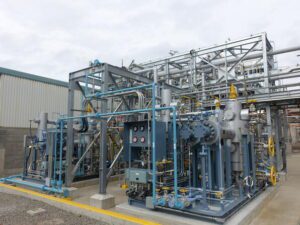Sumitomo Chemical Co. (Tokyo, Japan) has completed the construction of a pilot facility to establish a highly efficient process for producing methanol from CO2 at its Ehime Works, located in Niihama City, Ehime Prefecture, Japan, and has commenced operations at the facility. This facility was built with the support of NEDO’s Green Innovation (GI) Fund. The Company aims to complete the demonstration of this technology by 2028, as well as start commercial production using the new process and license the technology to other companies in the 2030s. Earlier this year, the company announced that it is constructing a pilot plant to demonstrate a new technology to convert ethanol into propylene.

The new pilot facility (Source: Sumitomo Chemical)
Carbon capture and utilization (CCU) technology is expected to serve as a game-changing solution to halt global warming and achieve a circular economy for carbon by recovering CO2 and utilizing it in products, and Sumitomo Chemical is accelerating the development and spread of various new CCU processes. Among them is a technology that uses CO2 to produce methanol, a raw material for a wide range of products, from plastics to adhesives, chemical agents, and paints. It is often cited as a key example of CCU technology. However, conventional CO2-to-methanol conversion processes have faced challenges, such as low yield due to the reversible nature of the reaction and catalyst degradation caused by byproduct water.
Sumitomo Chemical has resolved these issues through joint development with Professor Koji Omata of Shimane University Interdisciplinary Faculty of Science and Engineering, leveraging the internal condensation reactor (ICR), a technology that Professor Omata has been developing. The ICR enables the condensation and separation of methanol and water within the reactor, which is impossible with conventional technologies. This helps to improve yield, downsize equipment, and achieve higher energy efficiency, while it is also expected to prevent catalyst degradation.
Sumitomo Chemical is working on six development themes that have been selected as GI Fund projects. They include four chemical recycling technology projects, a project for the development of a CO2 separation and capturing system using CO2 separation membranes, and a project for the development of a battery cathode materials recycling process. The Group will strive to achieve carbon neutrality by 2050 and contribute to achieving a sustainable society by advancing research and development, demonstration, and implementation across society of innovative manufacturing processes.